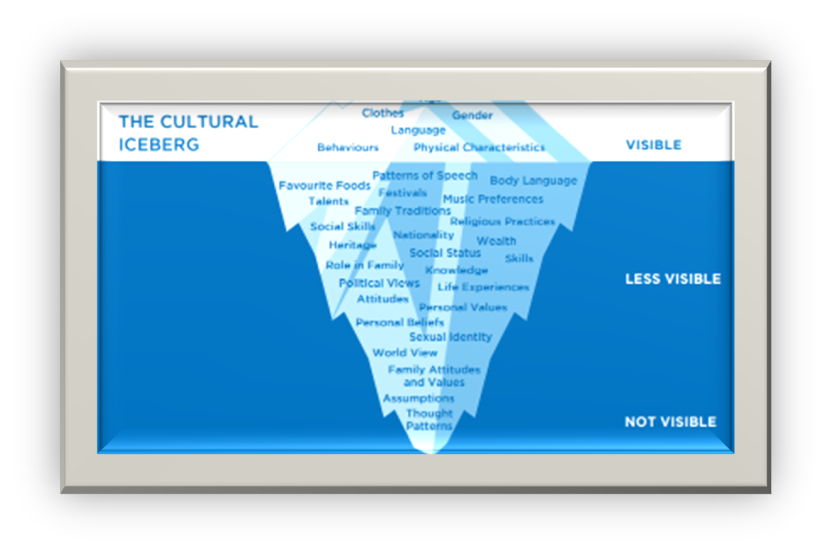Culture matters when you start your own business What does culture mean to you? What do you know about your own culture. What do you know about Canadian culture.
Canada is made up of many different cultures. Maybe you have noticed things that people do or say that is different from what you do in your country. Canadians often say, “Sorry”, and love hockey and donuts. These are things you may have noticed on the surface of Canadian culture.
Have you noticed Canadians usually stand two to three feet apart when they speak to one another. Or if an employee and manager don’t agree on something, they talk about it and find a solution. Personal space and solving disagreements are examples of deep culture.
Imagine “culture” as a huge iceberg. You can see the tip of the iceberg, but you can’t see most of it below the surface. Our values are like the hidden part of the iceberg. When we see someone, we only see a bit of who they are. We see how they dress, dance, play and celebrate, but we do not see their values.
Values are important to how we live in the world, but we don’t really think about them. We learn values at a very young age, and they become part of our individual culture. No one can understand what your values are just by looking at you. Your values are hidden. These hidden values are the unspoken rules of a culture. It takes much longer for a person to understand the hidden values of another culture. It is important for everyone to try to understand the values of another culture, so we do not get frustrated.
Three things for immigrant entrepreneurs to think about:
- Become more aware of your cultural heritage Explore your heritage, place of origin, time of immigration, reasons for immigration, spoken languages, religion, jobs, status, beliefs, family history and roots. It is important to understand how the culture of your home country has shaped your values, customs and behaviours. When you are more aware of your culture, you will be more understanding of the cultures you meet in Canada.
- Examine your values and beliefs What is important to you in business? How do you like things to be done? For example, do you engage in small talk? People who are direct and do not engage in small talk before discussing business may be thought of as rude by people who like to have a personal connection before negotiations start. Also, think about how a person who values humour and optimism might feel uncomfortable with people who are pessimistic or complain a lot.
- Gain culture-specific awareness and understanding
- Notice how others behave and notice how they react to your behaviour.
- Learn through books, websites, the arts, and technology.
- Talk to your neighbours, friends and colleagues, and network.
- Participate in the daily life of another culture; celebrate its holidays.
- Become active in community projects, such as school, religious organizations, or community groups.
Tips for Successful Cross-Cultural Management
- Try to understand the world from the point of view of others.
- Keep an open mind.
- Take risks.
- Practice behaviour that might feel unfamiliar at first.
- Be flexible.
- Have a willingness to accept other viewpoints.
- Be open to new ideas and have a sense of humour.
- Experiment with adding your own cultural flavour to groups or contacts.
- Adapt your management style to fit with those you find already in place.
